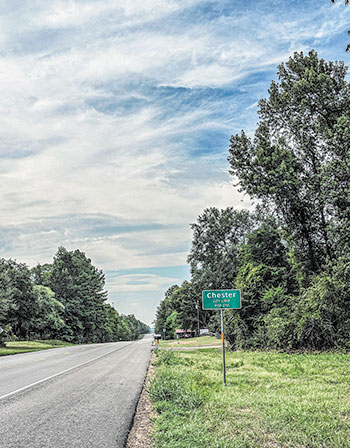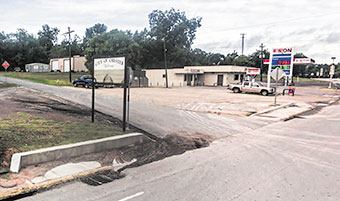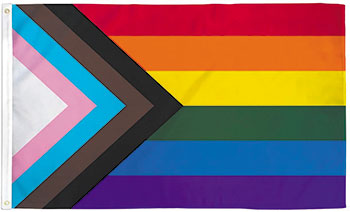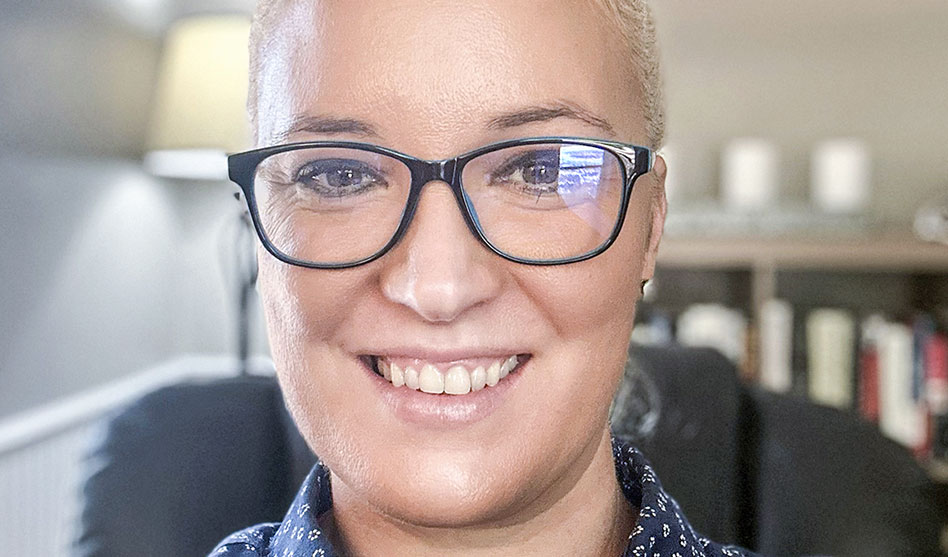Caitlin Friege (Courtesy photo)
How one lesbian couple’s ‘safe haven’ is falling short
CAROLINE SAVOIE | Contributing Writer
carosavoiswriting@gmail.com

The Chester city limits, population 270 (Photo courtesy of Caitlyn Friege)
EDITOR’S NOTE: Chester Mayor Robert Poynter was contacted for comment on this story. As of press deadline, he had not responded.
When Caitlin Freige and her wife of 18 years moved from Los Angeles to Chester, Texas, last April, they thought they were trading the chaos of the city for a quiet safe haven in a town of 277 people. But, Freige said, their lived experience hasn’t been as idyllic as they’d hoped, and she suspects that has something to do with her sexuality.
Freige said their criteria for finding a new home was simple: affordable, rural and community-oriented. As a licensed clinical social worker and long-time community organizer, Freige said she wants to be involved in the town happenings, but she’s had trouble gaining a foothold. And, she said, what scares her most about living in Chester is lack of fair representation in local government, especially where it involves LGBTQ+ residents.
On June 2, three months after the move and two days into Pride Month, Freige noticed a series of Facebook posts written by Robert Poynter, Chester’s mayor. She sat at her kitchen table with her wife that morning, struggling to believe what they were reading.
Above a picture of a Confederate flag, Poynter had written: “This flag has nothing to do with being racist, it’s a Flag of Rebellion and I am rebelling against this foolishness they are shoving down our throats, Gay Pride? What are they so Proud of?”
Freige said her heart dropped, but she and her wife kept reading.
“Are they proud of the fact they don’t know what sex they are, Proud they can’t get a woman if they tried? Proud they kiss pickles and shove their pickles in the wrong holes of other pickle kissers?” her mayor had written.

An image from Google Maps at one of the main intersections on Highway 287 through Chester, Texas. The sign says welcome, but at least one resident feels less than welcome there.
A few hours later, Poynter took to social media again, this time describing the Progress Pride flag, one with chevron stripes of black, brown, blue, pink and white. The Human Rights Campaign site said that when designing the flag, Daniel Quaser added the white, pink and light blue stripes to represent the transgender community. While the black and brown stripes represent communities of color, the black stripe is also a nod to those who died during the HIV/AIDS crisis.
Poynter had a different take: “First there are the Black and Brown chevrons, it stands for Black and Brown people attracted to minor children,” the post reads. “Next there’s the blue chevron, it stands for attracted to young minor boys, then there’s the pink chevron, it stands for attracted to young minor girls. Then you have the white triangle, it stands for attracted to young minor virgins of all sorts.
“Maybe now, you’ll understand how sick our government really is by allowing such displays,” Poynter wrote. “Maybe now you’ll understand the sickness that has taken over our nation.”
Freige said she looked at her wife and thought, “What did we do?” She said they’d seen some of his posts before and knew Poynter was unabashedly conservative, but this was the worst they’d seen yet. She said the number of people who supported his views in the comments made it clear to her that her family would be in the minority there when it came to LGBTQ rights.
“Other mayors in Texas have stepped down from their positions or been fired for authoring much less offensive material on social media,” she said.
Because some town officials — like Councilman and volunteer firefighter Chris Cocco and Fire Chief and Mayor Pro Tem Bryan Davis — don’t have social media profiles, they said they didn’t know about the posts until Sept. 12.
“This upsets me, because I’ve lived here my whole life,” Davis said. “It’s my hometown of 63 years, and I’m proud of it. I don’t want anyone — whether it’s Robert or my neighbors — to be unethical. If he doesn’t hold himself in a professional manner, his leadership is not where it needs to be in our town.”
Davis said the town used to have a large sign that read “Welcome to Chester, The Town of Friendly People.”
“That’s the way it’s always been,” he said. “Do they always get along? No. But we always come together. Social media has been the downfall of every little town, in a way. I shouldn’t have to apologize for the community. We should uphold those standards.”
At a town gathering for the Fourth of July, Freige said she and her wife sat with Poynter and his wife for hours talking. She didn’t say anything about the post but instead said she wanted to help out with the local park’s grand re-opening. When she reached out to him about setting up a chili-dog stand at the park in hopes of “building a bridge,” he did not respond.
Freige said she messaged him directly, and after “stalling the idea for a while,” he asked for a deposit to be able to sell concessions at the park.
“You want to charge me money to feed people for free?” Freige said. “It was ridiculous, and I was fed up.”
Freige took the screenshots of Poynter’s June 2 posts and posted them to her own page. “As a professional who provides care to the LGBTQ+ community, it is my duty to bring attention to this egregious behavior in a public office,” she said.
Overnight, the Chester city secretary and a city councilwoman unfriended Freige, and Poynter responded on his own page.
“Well the truth comes out, it’s not about equality, it’s about acting like a victim because I said men who dress like women to dance in front of kids were nothing but pedophiles,” he said. “I stand by what I said, but these two women went to the media trying to bring trouble into our small community because I as Mayor have an opinion about Drag Queens and our children. Gone to the media to try and bring trouble, saying I offended a federally protected class of people.”
Freige said what she saw next validated the fear that her neighbors in this new town might turn on her: “You moved here, and many people have gone out of their way to make you feel at home, and this is how you treat those people,” Poynter said. “All you’re doing is reinforcing the stereotype mentality people have about you.”
Freige said she and her wife bought handguns, put cameras outside their home and placed a sign in their yard that they’re armed. But, she said, she’s afraid to put a Pride flag out. “I hope that no one does anything, but we feel vulnerable, and we’re living in fear,” she said.
Davis and Cocco said they know of several LGBTQ residents of the area, but they’ve never seen a Pride flag out. Davis said he believes those residents would be supported for raising their rainbow flags, but he acknowledged that there are those who hold anti-LGBTQ beliefs, as demonstrated by Poynter’s posts and the support those posts have garnered online.
“Every town has those people, but they shine brighter in a small town like Chester,” Davis said.
Davis also acknowledged that some residents were “hollering” when Freige raised the Texas state flag outside her home but flew it upside-down.
Freige said that people who hold such drastic anti-LGBTQ beliefs as Poynter espouses should not be in charge of social spaces or hold public office. “I’m not going to stay in a group controlled by someone who likens my family to pedophiles,” she said. “You don’t represent me when you talk like that.”
Davis said he doesn’t want his town’s reputation to be tarnished by bigoted beliefs or unfair representation on Poynter’s part.
“How he handles this will help us figure out our next steps,” Davis said. “I don’t want to see my town destroyed by one person.”
Based on the rhetoric in Poynter’s posts, Freige said she doesn’t think he represents anyone who isn’t cisgendered, heterosexual or white.
Although Davis and Cocco said they haven’t heard any derogatory remarks firsthand, Friege said she has been referred to as a Satanist and an entitled Californian, has faced microaggressions and often hears anti-LGBTQ talk around town.
“I can handle that,” Freige said. “Talk all you want. Post all the Bible quotes. But when you’re an elected official who goes out of his way to target my community, call us derogatory names and display unethical discriminatory behavior, I have to say something.”
Freige said she faced issues getting her water and gas utilities set up before they moved in. “It’s this  whole timeline, from utility issues and comments around town to these posts and this hatred coming towards us,” she said. “Some are covert, and some are egregious, but it all makes us feel isolated, unrepresented and unsafe.
whole timeline, from utility issues and comments around town to these posts and this hatred coming towards us,” she said. “Some are covert, and some are egregious, but it all makes us feel isolated, unrepresented and unsafe.
“I feel subhuman.”
Because the town is so tightly-knit, Freige said she saw that rising tensions interfered with her ability to get resources, be involved in the community and get access to public services like utilities and safety services.
“I can’t figure out how to file a formal complaint, and based on experiences with the town secretary, I don’t feel safe or comfortable filing a complaint with her,” she said. “I have to go to the people who are being derogatory and abusive to find out how to exercise my rights.”
Freige said she and her wife were warned when they moved to town that people have gone missing, and violent crimes are allegedly waved away. The town is served by a volunteer fire department, and Freige fears the worst if she would ever need services.
But Davis said that’s one thing Freige doesn’t need to worry about. “If they called right now and had a fire, we’d respond,” he said. “It doesn’t matter what race you prefer or the person you love, we’ll take care of you.”
Freige said she was fearless when she moved to Chester from L.A. Now, she’s scared, but she is still determined to make a difference.
“I would love for everyone to come together and respect each other as humans,” she said. “When people see you as subhuman, they feel justified treating you differently. You can’t have a seat at the table because there is no seat. I’m trying to put that chair at that table.”


Move to a small town outside of Austin TX if you want acceptance. We value our strongly held beliefs. That’s not to say you are not welcome. But if you are going to bring your ideology into our commi it and try to force us to accept you then that is your mistake. Yes. He should have been more professional and less offensive. His opinion is void because of his delivery. But notable of us agree. That’s what is great about our country. Freedom. We don’t have to agree. You need to remember that when you come to a small town.